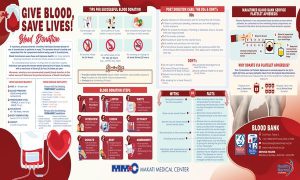Your liver plays a vital part in your body’s daily functions. Primarily known to filter and cleanse out toxins, it also manages your body’s metabolic functions and strengthens your immune system. It’s not just one of the body’s most important organs—it’s also one of the most sensitive. If you don’t take care of your liver, you can develop illnesses that can significantly affect the quality of your life.
Taking action against any disease starts with awareness. Hepatitis is a well-known illness that has plagued countless of lives. This viral infection causes inflammation and swelling of the liver. This disease can also be a result of poor hygiene, substance abuse, or unsafe sex. In this guide, we’ll discuss different symptoms, methods of transmission, and treatment required by Hepatitis A, B, and C patients.
Hepatitis A
Hepatitis A is caused by the transmission of the Hepatitis A Virus (HAV). The virus is commonly acquired by ingesting food or liquid that is contaminated with the virus or any fecal matter. Once the virus enters the bloodstream, it eventually finds its way to the liver and causes inflammation and swelling.
Aside from eating contaminated food, the virus can be transmitted the same way as the flu. If you’re in contact or living with a person infected with Hepatitis A, you must be extra cautious since the disease can be easily passed from one person to another.
Symptoms of the disease include:
- Fever
- Nausea and vomiting
- Abdominal pain
- Loss of appetite
- Dark-colored urine
- Light-colored stool
- Yellowing of the eyes and skin
Once a person catches the virus, he’ll be contagious two weeks before the signs start to appear.
There’s no formal treatment required for Hepatitis A. People who have had mild cases can recover without experiencing any permanent liver damage. Since it’s an acute disease similar to the flu, the infection will eventually go away on its own. Treatment is focused on dealing with your symptoms, and taking daily measures such as drinking water, eating the right food, and avoiding alcohol.
Fortunately, a vaccine is available to prevent the illness. However, cleanliness and hygiene are still the best options against the disease. Wash your hands often, make sure that the ingredients you’re preparing are clean, and avoid all kinds of beverages if you’re unaware of their origin.
Hepatitis B
Unlike Hepatitis A that only affects a person for a short time, Hepatitis B is a lot more dangerous. According to the 2015 report of the World Health Organization (WHO), it’s estimated that 887,000 deaths were caused by complications from Hepatitis B. Other than chronic infection, this type of Hepatitis can also lead to other severe conditions such as liver cirrhosis.
Hepatitis B Virus (HBV) is commonly transmitted from mother to child during birth, but it can also be acquired in the same manner as HIV or Human Immunodeficiency Virus. Being pricked with unsterilized needles, unsafe sex, and direct contact with an infected person’s blood are some common ways to contract the illness.
Symptoms of the disease include:
- Fever
- Nausea and vomiting
- Abdominal pain
- Extreme fatigue
- Dark-colored urine
- Pain in the joints
- Yellowing of the eyes and skin
The disease is contagious, but luckily, it cannot be transmitted when you share the same utensils with a patient, or through sneezing or coughing. Instead, it can be contracted directly through bodily fluids.
If you plan to have surgery or get a tattoo soon, make sure that the tools used are clean since HBV can survive outside the body for seven days, during which time it can still infect a person who isn’t vaccinated against it.
Acute Hepatitis B has no formal treatment, but the chronic form will require lifelong medication. Antiviral medication, interferon injections, and a liver transplant are your best options against the complications you’ll face. If you want to stay free from any risk, a vaccine is available. To further reduce the probability of acquiring Hepatitis B, develop good hygiene and practice safe sex.
Hepatitis C
Once a person is exposed to the Hepatitis C Virus (HCV), acute hepatitis—which only lasts for a short time—occurs within six months. However, it can evolve into chronic hepatitis and cause serious long-term health problems if left unmanaged. Without any countermeasures, you’ll be at greater risk of acquiring fatal diseases such as liver cancer or failure.
Some symptoms to watch out for include:
- Fever
- Dark-colored urine
- Abdominal pain
- Loss of appetite
- Pain in the joints
- Yellowing of eyes and skin
With no vaccine available, it’s estimated that there are 71 million people worldwide diagnosed with this blood-borne virus. Similar to Hepatitis B, you can acquire Hepatitis C through childbirth, blood transfusions, and using unsterilized needles. You can’t get the virus through casual contact.
Luckily, innovations have been developed to counter Hepatitis C. If you’ve been experiencing the symptoms of the disease, your doctor will do a series of tests to know the genotype and amount of HCV in your blood. Your doctor may also require a liver biopsy to examine any impairments.
After all the tests have been made, you’ll undergo oral therapy and be prescribed with pills. Of course, prevention is still better than cure. Just like Hepatitis B and HIV, you can prevent Hepatitis C by being cautious of tattoo needles and piercings, and practicing safe sex.
Keep Hepatitis at Bay
As of 2017, the WHO states that there are approximately 325 million people globally who are suffering from hepatitis. This statistic alone shows that extra measures must be taken to keep the public safe from the illness. Do your part and share this quick guide with your friends and family so they can also stay safe.
Are you experiencing any of the symptoms mentioned above? Consult with an expert immediately. Contact us now at +6328 888 999 or email us at [email protected] to avail of our gastrointestinal endoscopy services.









